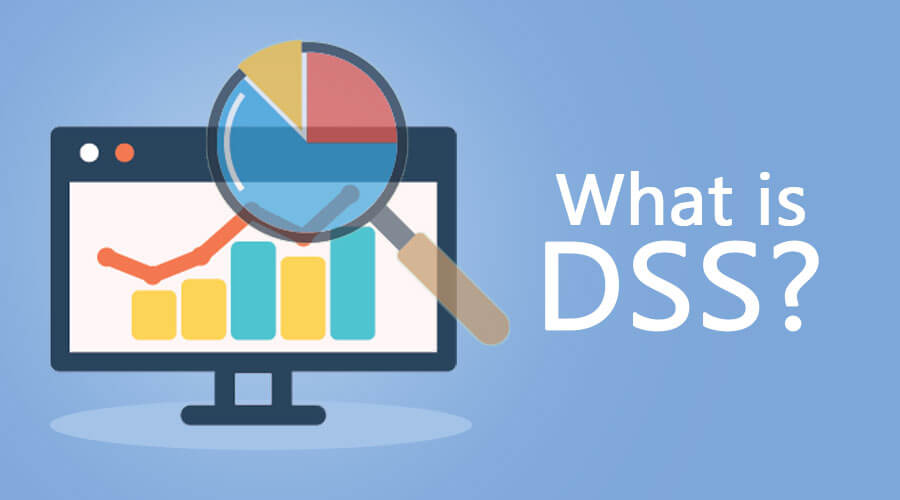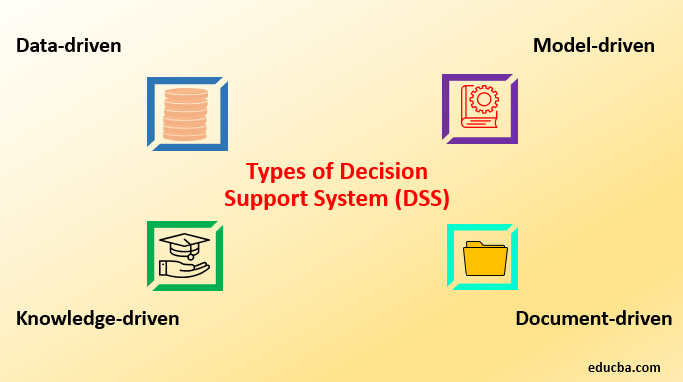Updated March 14, 2023
Overview of DSS
A decision support system (DSS) is a computerized information system used to help in decision-making activities in an organization or a business by analyzing large datasets. It compiles the information that can be used to solve problems and make better decisions.
It proposes using the theory of options to systematically analyze, understand, and quantify flexibility systematically through DSS use to a class of decision-making scenarios. The flexibility derived from this application is conceived as an options portfolio change in value. Anecdotal evidence of DSS value reported in the MIS literature is compared with the information provided by options theorization. Provide education and support to University members who provide support to disabled students.
Components of DSS
There are 3 main fundamental architectural components which are as follows:
The Users
The main component of the Decision Support System is the user. As DSS uses are normally managers, policymakers, etc., who may not qualified computer expert; hence DSS should provide easy to use interfaces and some guidance for using DSS and also interaction with the model, such as getting recommendations from it.
The main goal of DSS is to make sure that the users are utilizing and get benefitted from DSS.
Database Management System (DBMS)
A DBMS acts as a data bank for the DSS. It stores large quantities of data collected from different sources. It provides logical data structures for user interaction. Inputs and outputs are stored in The database. All the processing is done in the database.
DBMS should inform the system user about how to access the database and the different types of data available.
Model-based Management System (MBMS)
This system’s function is to fetch the data and from DBMS and transform that data into information that helps for proper decision making. It should also provide proper assistance to the user for model development.
Components of DSS
Components of DSS can be categorized as:
- Inputs: Records, Data factors, numbers, and characteristics for analyzing.
- User Knowledge and Expertise: To run the proper functioning and provide inputs, the user must know how to use the system.
- User Interface: DSS should support model construction and model analysis by providing a well-structured user interface.
- Decisions: Based on user requirements, results are generated by the Decision Support System.
Types of Decision Support System
There are various types of decision support system, which are classified as:
1. Data-driven
Decision Support System includes file drawer systems, data analytics systems, analytical information systems, data storage systems and emphasizes access and manipulation of large structured data databases.
2. Model-driven
Decision Support System model comes from a variety of fields or specialties and could include accounting models, financial models, representative models, optimization models, etc.
3. Knowledge-driven
This Knowledge-driven focuses on knowledge and advise managers to take action on the basis of a certain knowledge base analysis. Predefined facts, Stored procedures, rules, and limitations are also referred to solve problems. It also has special expertise in problem-solving and is closely associated with data mining.
4. Document-driven
This system helps managers obtain and manage unstructured documents and web pages by integrating a range of storage and processing technologies to provide a complete review of documents and analysis.
5. Communication -driven
This is also called group decision support systems (GDSS). Communication driven DSS includes more than one person working to solve complex problems. It helps executives and managers work together to come to the final solution to solve problems. Technology can be used for Communication driven DSS like Microsoft’s NetMeeting, Groove, etc.
Advantages of a Decision Support System
- It Saves Time by speeding up the process of decision making.
- It Improves communication between people through meetings, brainstorming sessions, etc.
- Reports generated by the Decision Support System can be used as evidence.
- It helps to automate processes.
- Reduction of cost
Disadvantages of a Decision Support System
- Overload Information
- Reduction of status
- Unanticipated effects
- Cost in Monetary
- Too much DSS dependency
Where Can We Use DSS?
There are so many ways where we can use DSS. We can use the Clinical decision support system for medical diagnosis. The bank loan officer can use DSS to verify the credit of a loan applicant or an engineering company that is working on various projects and wants to make sure if they can be competitive with their expenditures. DSS is mostly used in business and management, which helps for the identification of negative trends, and better allocation of business
DSS is no longer limited to large, bulky mainframe computers as technology continues to move forward. DSS is basically a software application; hence it can be loaded with laptops, Tabs. Also, some DSS applications can be accessed via mobile devices. For the user who travels commonly, DSS flexibility is extremely beneficial. This allows you to be always well informed, which allows you to make the best decisions at all times for your business and clients. The ideal systems are able to use and analyze information to make user choices. DSS includes data focuses on the target or forecast revenue and sales, time periods, sales figures, and other inventories.
Conclusion
DSS can be highly useful for the overall performance of any organization. However, DSS could also cause big confusion, misunderstanding and even inaccurate analysis. Decision support systems provide the basis for how the systems work in the company and how managers’ quality decisions can be improved.
Recommended Article
This has been a guide to What is DSS?. Here we have discussed the Components of DSS and the Various Types of DSS along with its Advantages and Disadvantages. You may also look at the following articles to learn more –




